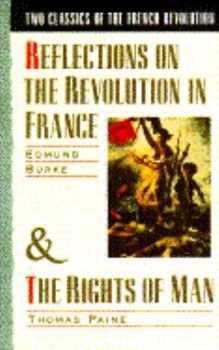Two Classics of the French Revolution
Select Format
Select Condition 
Book Overview
Published in 1790, two years before the start of the Terror, this work offered a remarkably prescient view of the chaos that lay ahead. A classic of political science and a cornerstone of modern... This description may be from another edition of this product.
Format:Paperback
Language:English
ISBN:0385265778
ISBN13:9780385265775
Release Date:July 1961
Publisher:Anchor Books
Length:515 Pages
Weight:0.70 lbs.
Dimensions:1.1" x 5.2" x 7.9"
Customer Reviews
1 rating
Burke's evils of the French Revolution
Published by Thriftbooks.com User , 15 years ago
This was required reading for a graduate course in the history of the French Revolution. In Burke's book Reflections on the Revolution in France, he penned a diatribe against the evils of the French Revolution, believing that there was a pernicious cabal of philosophes and politicians joined by money-jobbers whose aim was to topple not only the old regime in France, but to export their "plague" throughout Europe. Thus, Burke astutely understood and abhorred the influence that Radical Enlightenment ideas had on the French Revolution. One instantly detects, in Edmund Burke's Reflections on the Revolution in France, a conservative philosophy by which he not only understood his own society, but the entire human civilization. Much of his work was an appeal to a politically conservative notion of a "created order" of the world, which from this reading seemed to be universal to all European nations. This reader sensed that Burke's Reflections were written as a warning to the rest of Europe not to follow the model of change embodied in the French Revolution, and to adopt the steady reforms that took place in England. Burke found no social redeeming value in the French Revolution and when he wrote Reflections, the worst of the "reign of terror" had yet to come. In fact, if one used Georges Lefebvre's notion of "four acts" to the Revolution, Burke poured out all his criticism against the first two acts, the aristocratic and bourgeois revolts. This reader found Burke's long sections on British history used to buttress his case; that change should have come to France within a more staid social order as either ignorant of the complex socio-economic and political factors that led up to the Revolution, or as a naïve belief that that the French people were so culturally close to the English that they should both react in similar fashion to socio-political upheaval. Burke delivered a literary "tongue lashing" to the French for how easily they turned their backs on their socio-political traditions. "You had all these advantages in your ancient states; but you chose to act as if you had never been moulded into civil society, and had everything to begin anew. You began ill, because you began by despising everything that belonged to you" (31). This reader found Burke's argument on this point a little disingenuous. He lectured how Britain's "Glorious Revolution" in 1688 should have been the model for reform. However, he barely mentioned the bloody English Civil War that Cromwell staged, including the regicide of Charles I. In addition, one's impression of Burke's information is that he had received a very narrow view of the history leading up to the Revolution and its opening days, which seemed confined to correspondence from a small circle of friends. Burke had high praise for the First and Second Estates. His opinion of the nobles he knew was that they were, "...for the greater part composed of men of high spirit, and of a delicate sense of honou





